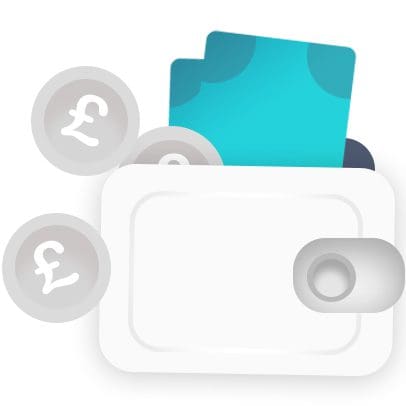
Enquire
Enter your details. It only takes one minute.

Compare
We compare the market to find you the best 3 quotes

Save
You receive your quotes directly from the provider
Business Bank Accounts: The Ultimate Guide April 2024
What is a business bank account?
Business bank accounts are distinctly different from personal bank accounts. It may be tempting at first to use your personal bank account for your business, but it won’t take too long for you to see the benefits of instead moving over to a dedicated account that you use for your company or trade.
However, it’s certainly not a good idea to ever consider doing vice versa and using your business bank account as a personal account. It should be strictly used for business transactions such as taking payments from your clients and sending wages to employees and payments to vendors.
Not all trades and businesses are legally obligated to open a business bank account, but advantages remain for businesses of all sizes. At the end of the year, you’ll probably be smiling at the upsides of having a business bank account such as access to insurance, easier taxes and your brand’s public image.
Just like personal bank accounts, business bank accounts differ slightly between different banks and building societies. It is possible to find different rates and offers suited to your needs if you’re willing to shop around, ask questions and find out what is suitable for you.
If your company is just starting out, you may keep an eye out for which business bank accounts are charging the lowest rates. If on the other hand, you’re handling a lot of money then you may be more interested in investment opportunities that your bank provides, or ease of transaction may be the first thing on your mind if your money is constantly moving.
Business bank accounts are able to do certain things that personal bank accounts can’t. One of the most important of these is the acceptance of credit card payments. Many people and small businesses expect to be able to purchase goods and services on credit without any extra hassle, so not having the ability to give people this choice is only going to negatively affect your income in the long-term.
It will also give you access to other things that personal bank accounts don’t such as business loans which are offered using very different parameters to personal loans and have very different tax implications. If you’re looking for your company to ever grow at some point in the future, having access to business loans is an essential option to have in your back pocket. It may be tempting to postpone opening a bank account until the day arrives when you require a business loan, but that means you can easily end up constantly playing catch up and hoping that the rest of the world waits for your applications and admin to get signed off on.
So who do these potential benefits apply to?
Should you get a business bank account?
For the vast majority of people reading this, the answer is probably yes, unless you accidentally stumbled here from some distant unrelated corner of the Internet.
If you own a business or are looking to set up a business, then chances are that a business bank account will be far more suitable for your needs than a personal bank account.
It’s not really a question of which is better for a business out of a business bank account and a personal bank account. The question is how long can you hang on with just a personal bank account before moving to a business bank account?
It’s not really a question of which is better for a business out of a business bank account and a personal bank account. The question is how long can you hang on with just a personal bank account before moving to a business bank account?
Within a year of starting your business, you’re probably going to start seeing the drag that holding onto a personal bank account exclusively can cause. It’ll make completing your taxes harder and as time goes on, you’ll also run into obstacles such as taking payments from credit cards, getting access to business loans, sending wages to employees and payments to vendors.
These issues are pressing for anyone who likes to stay prepared and make sure they’re ready for whatever’s around the corner in the business world, but any fresh-faced company is unlikely to keel over if the business bank account is not set up in the first week of operation.
Getting your business bank account set up may take a number of weeks, so don’t be afraid to take beginner steps in other areas of your company whilst bank checks are completed and the processing is getting finished off on the bank’s end. If one is ready to go a week or two before the other, it’s not the end of the world.
However, there is one case in which even this seemingly insignificant amount of time can make a difference to your business’s future.
Let’s have a look at the legal side of things.
Do you legally need a business bank account?
So, you’ve got your business plan up and ready to go and now you’re thinking about what the legal implications are for your banking. Or is it something you needn’t worry about at all, and you can continue using your personal bank account?
The answer to this question depends on the structure of your business. Remember though that this just applies to your legal obligations. Regardless of your business structure we still strongly recommend looking into setting up a business bank account.
Sole traders in most countries, including the UK, are not obliged to have a business bank account. Using a personal account for both non-business and business transactions is normally completely fine. But you’re also allowed to have an account for each, and you’re likely to find things like tax easier to do in an accurate and timely fashion further down the line if you have them separated, which certainly is a legal benefit.
Some banks have rules which mean you’re not allowed to use their personal bank accounts for business purposes. It’s always better to do some thorough research beforehand and make sure your bank isn’t going to suddenly call you out for misusing your account, which could leave you in a very sticky situation. If you don’t want to read through all of the terms and conditions associated with your personal bank account before deciding to put it to dual use – which is perfectly reasonable – then don’t be afraid to get in touch with the bank directly and ask for help. Not only can they inform you of what you’re able to do with your personal bank account but also point you in the right direction in regard to what options are available for business bank accounts.
Limited companies, on the other hand, are required by law in most countries including the UK to have its own business bank account. A limited company using a personal account for its expenses can end up getting into very big trouble, so it’s not worth ever using a personal bank account for your limited company.
It’s quite easy to tell if the label of sole trader or limited company applies to your work. If you are an individual with unlimited personal liability and control for a business’ operation, then chances are you’re a sole trader. Limited companies on the other hand have their ownership split into equal shares.
However, what starts as a sole trading business could very feasibly be a limited company a few years down the line, so it’s still helpful to have your business bank account set up if you’re a sole trader so that you’re ticking all of the right legal boxes when your venture grows in the future.
So now you know when you should and when you must have a business bank account, let’s have a look at what some of the best business bank accounts out there are today.
What are the different types of Business Bank Account?
In the UK you have access to a vast array of options when it comes to business bank accounts. There are lots of things you’ll need to take into account before deciding which account is right for your needs. Here we’re going to look at the business bank accounts on offer in the UK in particular.
Factors people normally consider include things like:
- Online and mobile banking services
- Access to overdrafts and loans (especially for small businesses)
- Account management
- Access to and service in branches
- Business centres
- Overall quality of service
Surveys are regularly conducted to see which providers are generally recommended by UK businesses, which can be a good starting point. However, don’t take these as the be-all and end-all as you still want to consider specific factors that may pertain more to you than the average business.
BVA BDRC is one of Britain and the world’s most trusted sources when it comes to business opinions and commerce services. The consultancy, which is part of the Paris-based BVA group, undertook a UK survey in 2021 that was exhaustive, asking over 17,000 small business banking customers their thoughts on their current provider’s service.
There was one clear winner, with Starling Bank finishing a whole 11 percentage points ahead of second place.
| Starling Bank | 86 per cent |
| Handelsbanken | 75 per cent |
| Metro Bank | 68 per cent |
| Santander | 61 per cent |
| Barclays | 58 per cent |
| Lloyds Bank | 56 per cent |
| NatWest | 56 per cent |
| TSB | 53 per cent |
| Royal Bank of Scotland | 53 per cent |
| HSBC UK | 48 per cent |
As you can see, there’s quite a lot of variation in overall customer satisfaction between different small business banking customers!
The survey also took in information on various aspects of how satisfied customers were with the small business banking account service they were provided. Unsurprisingly, Starling scored well in all areas, finishing in the top three for the best business bank based on both relationship & account management and services in branches & business centres.
Here we’ll have a quick look at the benefits of some of the top-ranking bank’s services.
Starling bank Business Bank Accounts
Starting with the winner, Starling bank are new on the scene but already making quite a big impact, as you can see!
There is a range of reasons why the newbie has done so well. Unlike most business bank accounts, customers at Sterling aren’t required to pay a monthly fee or charges for UK payments. You might think that with such a cheap option, the bonuses and features would be limited, but that’s not necessarily the case with Starling Bank.
They provide UK support around the clock so whatever’s worrying you or anytime you’re stuck with something finance-related, an associate is always on hand to help you find a solution.
Starling also scored really highly for their online banking. As a newbie on the scene, Starling don’t seem to be stuck in the same quagmire as old-school banks and building societies, whose websites and apps often appear to be a decade or so out of date. Their app is as slick as they come, and you’ll be able to navigate through your finances easily with your smartphone.
Despite being a fresh face on the scene and being a digital-based bank, though, Starling hasn’t skimped on the foundational things that make people trust their traditional banks so much.
Opening a business bank account with Starling means you’ll still get FSCS protection so that you know your money is safely held. You don’t have to be a small business to enjoy these benefits either, with Starling providing options for large businesses too.
The fact that they offer integration with various types of software also means that this is a bank worth considering what industry you’re in, as Starling’s adaptability should mean your business bank account fits into your vision for your company.
For those who want even more features, customers can pay for helpful tools like the Starling Business Toolkit which makes bookkeeping and tax returns even easier, meaning you don’t have to dread that month every year.
For those whose business has gone international, Starling also has good options with the Euro and US dollar business account which give you benefits for different currency usage and exchange.
They are a new face on the block, but Starling have hit the ground running. If you’re looking to sign up for your first business bank account then Starling really is one of the best choices out there for its price and features, as supported by its excellent results in the survey BVA BDRC conducted last year.
Starling’s digital services are widely regarded as one of the best out there
Handelsbanken Business Bank Accounts
Swedish bank Handelsbanken have been in the business since 1871 and are still regularly impressing customers year in, year out. They’re particularly well known for their management of relationships and accounts so you know that if you sign up with them, you’ll be well looked after.
They strike the perfect balance between global prestige and local attentivity. Have no doubt that they have customers all across Europe in various industries, but Handelsbanken still likes to be known as a local relationship bank.
This means that you can rely on fast and helpful customer service so you can always get insight and advice when you’re unsure on the next step for your business. This level of advice is one of the key benefits of switching over to a business bank account from a normal bank account. Not many banks offer a direct line to an account manager and team at your local branch, so you always feel like you’re getting the special treatment as Handelsbank.
To get specific details about things such as monthly fees, access to overdrafts and what currencies you’ll be able to trade in, it’s best to get in touch with your local branch to find out what they can offer you.

Metro Bank Business Bank Accounts
The last bank we’ll look at in detail is another new face on the block like Starling Bank. Coming in at third on the satisfaction survey, an impressive seven percentage points above the 4th placed bank, Metro Bank is another institution that has clearly had no trouble introducing itself to customers among the sea of old faces that people tend to associate with banking.
They’re especially well-regarded for their fantastic service in branches and business centres. Metro Bank branches are what a modern bank’ should look like. Whilst many older institutions still insist on shutting down outside of the 9-5 and therefore being unreachable for many of their customers, Metro Bank branches tend to open from 8:30-6pm, if not later. They’re also open on the weekends meaning that everyone will be able to get face-to-face assistance at one time or another. Somehow, other banks still haven’t caught onto this USP and for now it really sets Metro Bank apart from the rest.
You’ll have to be a UK resident to fit the bank’s criteria for a business bank account and your annual turnover must be under £ 2 million, so this is a better choice for small to medium-sized businesses.
Things will be especially cheap for you if you’re just starting out, with daily balances under £6000 resulting in no monthly charge. Even if you exceed this amount though, your basic monthly rate will still only be £6.
For transactions, you’ll again be looking at very low rates, with 30 free a month and only a 30p charge for each one after that. Accounts under the £6,000 cut-off will have to pay for every transaction, however. With the impact that Metro Bank is having on modern banking, you can bet they’ll be here in the long term and hopefully become more and more efficient as they grow.
Being the third highest rated bank in the UK for business bank accounts is all the more impressive considering how new they are on the scene and how much they’re shaking up the scene. Certainly one to look out for!
Metro’s in-person services are particularly acclaimed
Other options for Business Bank Accounts
There are plenty more options to choose from for your business bank account in the UK. We’ve only looked at the top three here but there are many who are recommended by over 50% of their customers and whilst a high average score is important, having a service that’s tailored to your needs is as important, if not more crucial than the general public’s satisfaction.
Take the time to shop around and talk to different providers about what they can offer you. General rates are normally easy to find online but an associate may be able to let you in on special time offers or hidden benefits that make one provider or another even more suitable to you.
Banking is a competitive market like any other and if you’re happy to talk to different options and let the providers know you’re doing so, you may even get offered lowered rates or specially approved deals.
The bigger your business is, the more keen the bank will be to have you in most cases too, so do some preparation! The more you can show off your company’s worth and the potential for growth it has, the more keen banks will be to work with you. So get your presentation as shiny as possible and show it to as many banks as you can so that you end up with the best business bank account available to you.
Is it legal to transfer money from a business account to a personal account?
As long as you pay the money back to your business in a reasonable time frame, then there is nothing in UK law preventing you from personally using your business’ bank account.
The time factor is an important one though, and the longer you leave it to repay it back, the more tenuous the link between the two transactions becomes if it ever needs to be looked into. Whilst it’s an acceptable thing to do from time to time, it’s not recommended to get into the habit of using either your personal or business bank account for the other’s purpose.
Take your time getting the two in order and then try and stick to keeping them apart as appropriate.
The exception here is the regular income that you set up, which is probably what you’re living on. If this is regular and above board, then you have nothing to worry about, and an associate at your branch should be able to help you set this up in a way that doesn’t overly complicate your taxes whilst making sure your hard work is also supporting the lifestyle you want.
Conclusion for Business Bank Accounts
Business Bank accounts are a great tool for anyone who likes to save time on their taxes and have a clear view of their business’ finances. There are so many options available out there that setting one up should be seen as a great opportunity to find a partnership that really works for you and your company’s needs.
We recommend that all sole traders and limited companies look into getting one as soon as possible so that they can start enjoying the many benefits with taking this important step.
James Ward is CEO and founder of CompareYourBusinessCosts.co.uk, a website that won the Prestigious ‘Website of the Year’ only in its second year of operations in 2015. The website has grown organically since then offering comparisons on over 20 different products including insurance, energy, telecoms, card machines, coffee machines and much more. James has a range of interests including horse racing, skiing, rugby and boxing. He splits his time between home family life, friends, exercise and socialising.







